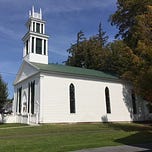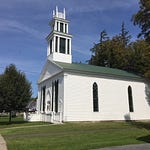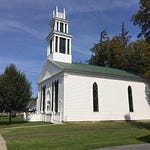Dear Friends,
It is with a measure of sadness that I write about the schism in the United Methodist Church. Fifty years ago, in over a hundred venues around the nation, I toured with a one-man show on John Wesley, appropriately titled, A Heart Strangely Warmed.
It was a joyous season, traveling from seminaries to colleges to denominational conferences to churches large and small, sharing the life and message of this extraordinary Oxford don and itinerant evangelist. How times have changed in fifty years. The United Methodist Church of today has lost its way. As I’ve expressed it before, “If there were tears in heaven, Wesley would be weeping.”
But God is doing a “new thing,” and this essay/homily is Part I of a two-part podcast/publication—Part II of The Divided United Methodist Church coming out on May 29th, which will focus on the new Global Methodist Church, among other developments.
In the interim, a blessed Pentecost to you and yours—
“Come Holy Ghost, Our Hearts Inspire!”
D. Paul
The Church’s One Foundation Is Jesus Christ Her Lord!
The Divided United Methodist Church
Though anticipated, it’s now official: the United Methodist Church, the second largest Protestant Church in the US, will now consider LGBTQ individuals for ordination and permit the blessing of same-sex marriages throughout the denomination.
Two celebratory days of voting climaxed on Wednesday, May 1, with the removal of a 40-year-old ban on the ordination of “self-avowed practicing homosexuals,” the tally coming in at 692-51, a 93% representation of the voting legislative assembly. As the UMC’s 2024 General Conference met at Charlotte’s Conference Center and cast its historic vote, LGBTQIA delegates and their allies gathered on the floor of the convention to “sing, hug, cheer, and shed tears,” with Tracy S. Malone, President of the Council of Bishops, joining them in singing, “Draw the Circle Wide.” Personally, I’m not convinced that a euphoric chorus of hurrahs makes for a Spirit-led General Conference.
With little scriptural consideration for “…wide is the gate and broad is the road that leads to destruction” (Matthew 7:13, NIV), even as the Church’s circle widened, its budgetary noose tightened, with a severe reduction of the 2016 budget from $604 million to a proposed 2024 budget of $353 million, a 42% reduction—the direct result of over 7,600 churches departing the denomination since 2019 for friendlier, biblically orthodox pastures. This mass-exodus was facilitated by a policy of “disaffiliation,” instituted by a 2019 Special Session of the General Conference, permitting individual churches to leave the denomination “for reasons of conscience” while still retaining their property, an exit strategy that released the conservative churches from a centuries-old clause that held all church property in trust “for the benefit of the entire denomination.” That “exit” policy ended the last day of December, 2023.
This mass exodus, resulting in the absence of many conservative delegates from the 2024 General Conference, expedited the doctrinal death blow inflicted upon a once glorious Church that bore the holiness imprint of its inspirational founder, John Wesley. Though this massive, “progressive” schism was decades in the making, the final rupture has been quick and rather quiet, with little resistance from the traditional, marginalized brothers and sisters who remain within her ranks. Still, employing a Solomonic effort to stem the bleeding, delegates voted in Charlotte to institute a “regionalization” policy that would protect the right of the individual churches and clergy not to officiate or host same-sex weddings. But as author and Christian apologist, Sarah Stewart, observantly points out: “The delegates…praised the regionalization plan for allowing the UMC to remain connectional while disagreeing on doctrine. But how can we be connectional when we cannot recognize something as fundamental as one another’s marriages and ordained clergy? * The answer, Ms. Stewart, is simple: we cannot. The LGBTQIA agenda-driven activists within the UMC will not allow it. Their “love is love” ethos won’t allow it. Their T-shirts, worn at the General Conference, say it all:
The intended message, here, is neither generic nor random—the implication is clear: the orthodox churches within the UMC are churches of hate, and, in a devilishly topsy-turvy twist—“what fellowship can light have with darkness?”—or, put another way, what possible fellowship can the enlightened, loving progressives have with the homophobic, hateful traditionalists in their midst? None.
Eventually, the conservative churches remaining in the UMC will bow to the new, radically revised definition of marriage or be sacrificed upon the high altar of “full inclusion.” From the “progressive” perspective, the very “unity” of the Church demands it. Ignore as irrelevant and passé the “Social Principles” of old, which taught that “sexual relations are affirmed only with the covenant of monogamous, heterosexual marriage.” Forget, as unenlightened, the antiquated, biblical definition of marriage “between a man and a woman.” Now, as stated in the United Methodist Church’s newly “Revised Social Principles,” they declare, “…we affirm marriage as a sacred lifelong covenant that brings two people of faith [adult man and woman of consenting age or two adult persons of consenting age] into union with one another.”
And there you have it, my friends, the new United Methodist Church of today. It is a Church divided, and for all of its self-congratulatory praise in Charlotte it will remain a Church divided. The mandatory “training sessions” to “prepare congregations to receive the gifts and graces of appointed clergy without regard to…gender…marital status…or sexual orientation” are about to begin, leaving in their wake The Great Commission as local leadership spends its valuable time discerning the suitability of its first, openly bisexual candidate for Youth Pastor, etc., etc., etc., ad nauseam. Aaahh, forgive the long sigh, my friends, but for we ex-Episcopalians, it’s like watching the same movie twenty years later, only the dramatis personae have changed. And, like its predecessor, The Episcopal Church, the United Methodist Church will soon find itself as the cursed fig tree—dying on the vine. From its zenith, membership in The Episcopal Church has plummeted from 3.4M to 1.5M today. Any short-term victories for the UMC will be Pyrrhic at best. It may take a decade or more, but the rewriting of God’s Word will come at a terrible cost. It already has.
Well, thanks be to God, the faithful followers of Jesus in Africa are not buying into this sweeping revision of Holy Scripture imposed on them by the General Conference. They staged a protest at the Conference, denouncing the new “Social Principles.” I quote freely from their Position Statement of the Majority Delegates of the Central Conferences of Africa to the UMC General Conference. This “Position Statement” speaks eloquently for the African Delegates, for the nascent Global Methodist Church (more on it next week), and for Christians everywhere:
“…The United Methodist Church has changed the United Methodist definition of marriage - not because the Bible has changed. But because western culture has changed. At this Conference, The United Methodist Church has chosen to follow what pleases man instead of what pleases God…. It now defines marriage differently from what God created it to be in the beginning (Genesis 2:18, 23-25). It has changed the definition of marriage from how Jesus described it in Matthew 19 as one man and one woman. In Africa we do not believe we know better than Jesus. We do not believe we know better than God. We do not believe we know better than the Bible. We want the UMC to hear. We want our people in Africa to hear. We want the world to hear. We do not accept a change in the definition of marriage, and we will never accept marriage as anything other than one man and one woman….”
Oh that our desensitized hearts in America would be as awakened as our co-workers in Africa. But we have been worn down by an antagonistic culture, dispirited by the cold-shoulder of fellowship, and dismissed by the harsh judgement of peers and family. We might easily say, “Let the Broken United Methodist Church go and do its thing—let them go!” But before we “let them go,” may we clearly hear the words of our African brothers and sisters in Christ, and may we do our part to act upon those words—boldly:
“We have loved The United Methodist Church. We have been grateful for The United Methodist Church. We have joyfully served The United Methodist Church…. We are devastated now to be part of a denomination that officially contradicts the Bible's teaching on marriage and sexual morality. We return to Africa with important decisions to make regarding the future. Still, we go home full of hope, confident in Jesus, standing on the word of God, and determined to contend for the faith once and for all delivered to the saints. We return to Africa where the church is growing, nonbelievers are coming to faith and disciples are being made for the glory of our Lord Jesus Christ. To God be the glory! Amen!” (Emphasis Mine).
Under the anointing of the Holy Spirt and inspired by our faithful brethren in Africa and the burgeoning Global Methodist Church, may we too be “determined to contend for the faith once and for all delivered to the saints.”
Amen
* Callously Breaking Covenant: Reflections on UMC General Conference, by Sarah Stewart, May 3, 2024, from “Juicy Ecumenism,” The Institute on Religion & Democracy’s Blog. Apologies for pronouncing Ms. Stewart’s name as Steward.
Asbury United Methodist Church, Prairie Village, Kansas
















Share this post